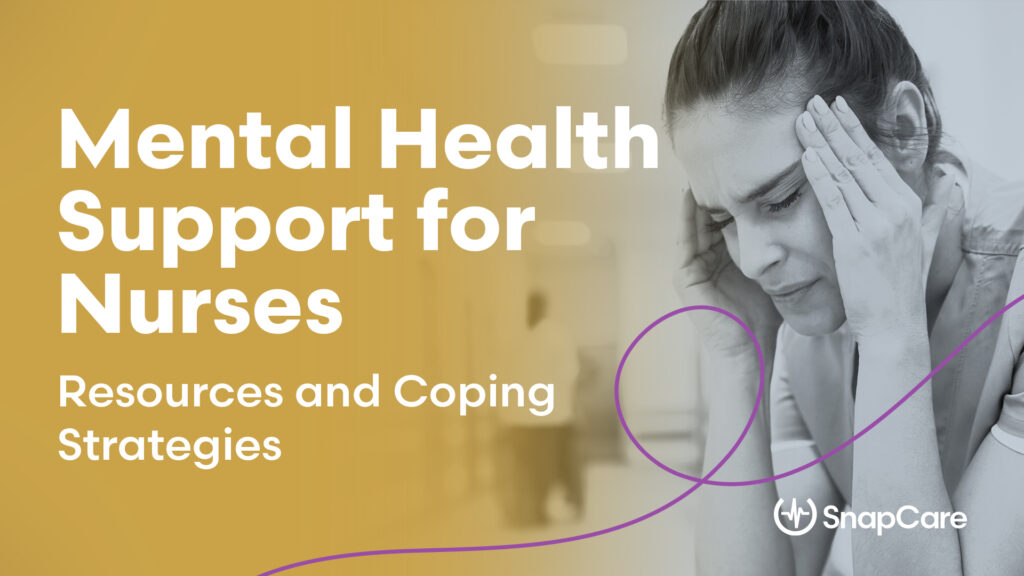Nursing is a profession of compassion and dedication, often synonymous with care and empathy. However, the very nature of this work can sometimes lead to mental health challenges like clinician burnout and compassion fatigue. Acknowledging and addressing these issues is crucial for your well-being as a healthcare professional.
In this article, we’ll provide you with a list of helpful resources, links, and easy-to-implement coping strategies. These are all about keeping your mental health in check and finding that sweet spot for your work-life balance.
Understanding the Challenges
The life of a nurse is usually filled with unique challenges. Long hours, high-stress situations, and emotional demands can lead to clinician burnout, a state of physical, emotional, and mental exhaustion caused by prolonged stress.
Compassion fatigue is another common issue among nurses, defined as the emotional residue of exposure to working with those suffering from the consequences of traumatic events. These challenges not only affect the mental health of nurses but also the quality of care they provide.
Why Should You Look Out For Your Mental Health?
Research underscores the importance of addressing mental health in nursing. A 2019 study published in the Journal of Clinical Nursing found that nurses who took care of their mental well-being through mindfulness-based interventions significantly reduced symptoms of burnout and fatigue. Take the case of John, a nurse who struggled with compassion fatigue. By practicing mindfulness and setting firm boundaries between work and personal life, he was able to find a healthier balance and provide better patient care.
Looking out for your mental health is not just about feeling good – it’s about being your best self, both at work and in life.
- You Can’t Pour from an Empty Cup: Think of your energy like a cup of your favorite coffee. If it’s empty, you can’t share it with anyone else. Looking after your mental health keeps your cup filled, so you can continue to care for others effectively.
- Quality of Care Depends on You: Your patients rely on you not just for their physical health but also for emotional support. When you’re in a good mental space, you’re more capable of providing compassionate and thorough care.
- Reduced Risk of Burnout: Nursing is intense, right? Constantly being on your toes can lead to burnout. But when you prioritize your mental well-being, you’re better equipped to handle the stresses and strains of the job.
- Better Relationships, Both Professional and Personal: When you’re mentally healthy, your relationships benefit too. You’re more patient, understanding, and present – qualities that make a world of difference in both your professional collaborations and personal connections.
- Improved Decision-Making Skills: Nursing is all about making quick, informed decisions. A clear and healthy mind is crucial for this. When you take care of your mental health, you’re ensuring that your decision-making skills are sharp and reliable.
- Increased Job Satisfaction: Let’s face it, you’re more likely to enjoy your work when you’re feeling good mentally. And when you’re happy in your job, you bring that positivity into every interaction – with colleagues and patients alike.
- Life Outside Work: You’re more than a nurse; you’ve got a whole life outside those hospital walls. Caring for your mental health means you get to enjoy your hobbies, family, and friends to the fullest.
- Because You Deserve It: Last but not least, you deserve to be mentally well. You do so much for others; it’s absolutely okay – in fact, it’s essential – to do something for yourself too.
Recognizing the Signs
It’s essential to recognize the signs of mental health strain to manage them effectively. Here’s a list of signs that might indicate mental health strains among nurses:
- Chronic Fatigue: Feeling tired all the time, even after rest. It’s not just physical tiredness but also emotional and mental exhaustion. This can be a sign of burnout, resulting from the constant high-stress environment nurses work in.
- Irritability and Mood Swings: Getting easily annoyed or having sudden mood changes. This might be a reaction to the ongoing stress and emotional demands of nursing, which can take a toll on emotional regulation.
- Decreased Job Satisfaction: If you find yourself no longer taking pride in or enjoying your work, it could be a sign of burnout. This often happens when the demands of the job start to feel overwhelming.
- Anxiety: Excessive worrying about work, even when you’re off the clock. Anxiety can manifest as racing thoughts, a feeling of impending doom, or even physical symptoms like an increased heart rate.
- Sleep Disturbances: Difficulty falling asleep, staying asleep, or experiencing restless sleep. High stress and anxiety levels can disrupt your sleep patterns, impacting overall health and job performance.
- Difficulty Concentrating: Trouble focusing or remembering things. This can be a result of both physical exhaustion and mental strain, making it hard to stay alert and attentive, which is crucial in nursing.
- Detachment from Patients and Colleagues: Feeling emotionally numb or disconnected from the people you care for or work with. This could be a coping mechanism to deal with compassion fatigue.
Mental Health Support Resources
Aside from recognizing the signs of mental strain early on, it is also important to be aware of the various mental health support resources available to you. Here are some of the most notable ones:
Employee Assistance Programs (EAPs)
Many healthcare institutions offer EAPs as part of their benefits package. These programs provide confidential assessments, counseling, and referral services to employees. They are an excellent first step for nurses experiencing mental health challenges.
At SnapCare, we offer our clinicians access to comprehensive medical plans and other benefits, including the WorkLifeMatters Employee Assistance Program (EAP). This program offers you and your family free, private counseling services. It includes round-the-clock access to professional advice and up to three in-person sessions for each issue you face each year, all at no cost to you.
Professional Counseling
Seeking support from a mental health professional can be beneficial. Therapists who specialize in working with healthcare professionals understand the unique stressors of the profession.
There are also several platforms and organizations that offer free professional counseling services specifically to nurses, such as the American Nurses Association’s Stress and Burnout Prevention Pilot Program and Well-Being Initiative.
Peer Support Groups
Sometimes, talking with colleagues who understand the specific challenges of nursing can be incredibly therapeutic. Groups like Support the Front and The Compassion Caravan are excellent platforms for this purpose.
Another one would be the Anxiety and Depression Association of America (ADAA), which provides free peer-to-peer support communities, which can be incredibly helpful for managing anxiety and depression.
Online Resources
Numerous online platforms offer resources and forums for nurses to discuss mental health, such as the following:
- Healthy Nurse, Healthy Nation™ (HNHN): This platform offers a variety of mental health resources, including blogs, podcasts, and tools for self-care.
- National Alliance on Mental Illness (NAMI): NAMI offers a broad range of resources for various mental health issues. Nurses can use the NAMI Helpline for free referral information and support.
- Hospice And Palliative Nurses Association: They provide resources to help nurses cope with grief.
Effective Coping Strategies
Incorporating effective coping strategies into daily life can significantly mitigate the effects of work-related stress.
Practice self-care
- Exercise: Whether it’s a quick jog, a yoga session, or dancing to your favorite tunes, physical activity releases endorphins, those feel-good hormones that act like natural stress relievers. Plus, it’s a great way to disconnect from work thoughts.
- Hobbies: Pick up that guitar, paintbrush, or knitting needle. Engaging in hobbies you love is not just fun; it’s therapeutic. It gives your brain a break from the daily grind and keeps your creative juices flowing.
- Quality Time with Loved Ones: Spending time with family and friends can be incredibly grounding. It’s a reminder of the wonderful world outside the hospital walls, filled with love, laughter, and support.
Use mindfulness and relaxation techniques
- Meditation: Just a few minutes of meditation can bring a sense of calm and clarity. There are tons of apps and online guides to get you started. It’s like a mini-vacation for your mind.
- Yoga: Combining physical postures, breathing exercises, and meditation, yoga is a holistic approach to stress relief. Plus, it’s great for your physical health too!
- Deep Breathing Exercises: When things get hectic, try deep breathing. It’s simple yet effective – just a few deep breaths can lower your heart rate and help you feel more centered.
Set boundaries
- Learn to Say ‘No’: You’re superheroes, but even superheroes have their limits. It’s okay to say ‘no’ to extra shifts or additional responsibilities when you’re already stretched thin.
- Realistic Expectations: Set achievable goals for your day. Remember, you’re one person, and there’s only so much you can do. Acknowledging this doesn’t make you any less dedicated; it makes you wise.
Empower Your Nursing Career with SnapCare
Mental health support for nurses is not just a luxury; it’s a necessity. By utilizing available resources, engaging in effective coping strategies, and learning from the experiences of others, nurses can not only improve their mental health but also enhance the quality of care they provide.
Remember, taking care of yourself allows you to take better care of others. And what better way to do it than to join SnapCare. With our platform, you get the life-changing flexibility to pick shifts that fit perfectly your lifestyle. Whether it’s local, short-term gigs, or something more long-term, you’re in control. Plus, we’re all about keeping you and your family healthy and happy. That’s why we offer various SnapBenefits, including comprehensive medical plans and Employee Assistance Programs.
Join SnapCare today and embrace a nursing career that prioritizes your mental health and fits your lifestyle.



